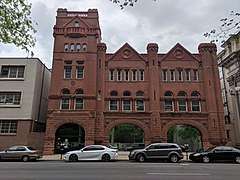Louisville Sinking Fund Building
The Sinking Fund Building, also known as Firehouse No. 2, is an historic building in downtown Louisville, Kentucky. Located on Jefferson Street between Louisville Metro Police Headquarters and the Louisville City Hall Annex building, it is part of the municipal office complex that comprises several neighboring blocks. The building currently houses the office of the Louisville Metro Revenue Commission, the primary municipal taxing authority for the city-county government. It was listed on the National Register of Historic Places in 1976.[1]
| Sinking Fund Building | |
|---|---|
 | |

| |
| Alternative names | Fire Station No. 2 Louisville Metro Office Building |
| General information | |
| Address | 617 W. Jefferson St. |
| Town or city | Louisville, Kentucky |
| Country | United States |
| Completed | 1891 |
| Renovated | 1937 |
| Height | |
| Architectural | Romanesque |
| Technical details | |
| Material | Red sandstone and bricks |
| Floor count | 5 |
| Design and construction | |
| Architect | McDonald Brothers |
| Designations | National Register of Historic Places, 1976 |
History
As a fire station
The building was designed by the McDonald Brothers architectural firm of Louisville as a fire department headquarters.[2] Constructed in 1891, it was financed by a sinking fund, which led to its subsequent name.[1]
Made of red sandstone and bricks, it was designed in a Richardsonian Romanesque design. The building originally had a five-story drying tower, supporting a belfry tower, that was used as a lookout to survey the surrounding area for signs of fire. Subsequently, the belfry tower was removed from the building. The facade of the building features relief sculptures of Benjamin Bache, the fire chief at the time, and Emile Bourlier, who was a bookkeeper for the sinking fund. Three large arches located at the base of the structure once served doorways for the horse-drawn fire engines housed in the building; the second floor was originally used as offices and sleeping quarters for the firemen.[1]
After the fire department moved out in 1937 to new facilities at 12th and Jefferson,[3] the police traffic department moved in.[4] Funds had been set aside for reconditioning the building to house the police headquarters, but they were diverted to reconstruction work after the Ohio River flooded that year.[5] The patrol division joined the traffic bureau in 1943.[6]
Becoming the Sinking Fund Building
By the mid-1950s, the police department had moved out. In 1957, the name "Sinking Fund Building" was used for the first time when a $97,000 renovation package gave the Commissioners of the Sinking Fund additional space on the first floor; the upper floors, used by the Welfare Department, received air conditioning as part of the remodel.[7] The Commissioners of the Sinking Fund, an agency originally chartered by the Kentucky General Assembly in 1852, were the predecessor to the Louisville Metro Revenue Commission.[8] The building housed the city's tax collectors at multiple times in its history.[1] It was also used to house equipment for a study of downtown air pollution in the mid-1960s.[9]
In 1969, a consultant working with the city recommended the building be torn down as part of construction of a modern civic complex;[10] the proposed $23.4 million governmental complex went to Jefferson County voters in November 1970[11] but was defeated by 15,000 votes.[12] Less than six years later, in September 1976, the city hall complex and Sinking Fund Building were placed on the National Register of Historic Places.[13] The Louisville Department of Building and Housing Inspection moved from City Hall to the Sinking Fund Building in 1975; the building was remodeled to accommodate the city department, including the installation of an elevator.[14] The renovation, which continued into the late 1970s, also included restoration work, such as the uncovering of the names of Bache and Bourlier on the front entrance.[3]
Citing a lack of space, the Sinking Fund moved out of 617 W. Jefferson in 1992 to offices on West Main Street, where it was able to consolidate its archives that were in the Sinking Fund Building and City Hall;[15] the Revenue Commission later returned to the building. The permit agency also relocated in 2004.[16]
References
- Luhan, Domer & Mohoney 2004, pp. 120–121.
- Kleber 2015, p. 599.
- Barrett, Courtney (November 4, 1978). "2 firemen's names to rejoin their faces on old city building". Courier-Journal. p. B-1. Retrieved August 18, 2019 – via Newspapers.com.
- "68 of 107 Drivers Are Tag Conscious". Courier-Journal. March 15, 1938. p. 8. Retrieved August 18, 2019 – via Newspapers.com.
- "City May Buy Labor Temple 'For a Song,' Burks Reveals". Courier-Journal. December 8, 1940. p. 6. Retrieved August 18, 2019 – via Newspapers.com.
- "Police Patrol Division To Enter New Quarters". Courier-Journal. March 14, 1943. p. 15. Retrieved August 18, 2019 – via Newspapers.com.
- "City-Building Remodeling Contract Let". August 1, 1957. p. 13. Retrieved August 18, 2019.
- Louderback, Tom (2002-02-04). "Occupational license tax return can be a bit tricky". BizJournals.com. Retrieved 2019-05-01.
- Crowdus, Vincent (January 22, 1966). "Air's Impurities Tracked Down". Courier-Journal. p. B-1. Retrieved August 18, 2019 – via Newspapers.com.
- Arnold, Kathleen (June 7, 1969). "Time for Decisions On Civic Center, Consultant Says". p. B-1. Retrieved August 18, 2019.
- Nolan, James (November 1, 1970). "Jefferson County Bond Vote: 7 Yeas Equal $58 Million". p. B-2. Retrieved August 18, 2019.
- Northern, Rick (June 18, 1971). "Hollenbach proposes 'safety complex' as only item for a November bond vote". Courier-Journal. p. 1. Retrieved August 18, 2019 – via Newspapers.com. ([https://www.newspapers.com/clip/35051691/ Continued)
- "City government buildings added to National Register". Courier-Journal. September 27, 1976. Retrieved August 18, 2019 – via Newspapers.com.
- "Building agency leaves City Hall". Courier-Journal. May 13, 1975. p. A-9. Retrieved August 18, 2019 – via Newspapers.com.
- Shafer, Sheldon (July 15, 1992). "Sinking Fund, short on space, plans move to West Main Street". Courier-Journal. Retrieved August 18, 2019 – via Newspapers.com.
- "Firehouses still serve". Courier-Journal. January 11, 2006. Retrieved August 18, 2019 – via Newspapers.com.
Sources
- Kleber, John E., ed. (2015). The Encyclopedia of Louisville. University Press of Kentucky. ISBN 9780813149745.CS1 maint: ref=harv (link)
- Luhan, Gregory; Domer, Dennis; Mohoney, David (2004). The Louisville Guide. Princeton Architectural Press. ISBN 9781568984513.CS1 maint: ref=harv (link)